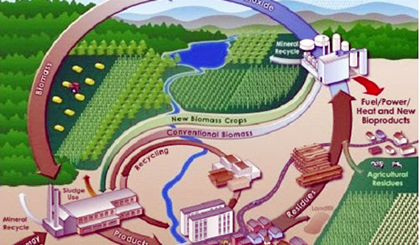Germany supports Vietnam on developing biomass power
The Vietnamese-German Development Cooperation’s Renewable Energy Support Project (RESP) on August 14 coordinates with the New and Renewable Energy Department under General Directorate of Energy (GDE) to organize the consultation workshop on biomass power investment guidelines for Vietnam.
The workshop is an activity within the framework of the RESP which is commissioned by the German Federal Ministry for Environment, Nature Conversation, Building and Nuclear Safety. It has been implemented by GIZ in close cooperation with GDE since 2012 to improve the regulatory framework for grid-connected renewable energy in the nation with focus on biomass, biogas and municipal solid waste.
The Decision number 24/2014/QD-TTg by the Prime Minister dated 24 March, 2014 on the support mechanism for the development of biomass power projects in Vietnam is expected to trigger the public and private investment in the biomass power sector. However, international experiences shows that a right feed in tariff and other policy supports alone are not enough to increase biomass application for power generation substantially.
 |
| Photo: CPV |
The event provides information on biomass power investment procedures including all relevant steps of the preparation, development and operation of the biomass power plant. Additionally, estimated duration and incurred fee as well as associated barriers and potential risks for each step will also be described. Participants are expected to see the real situation of the Investment process in the biomass power sector in the country, which will be finally reflected and publicized as an e-guide book for biomass power investment for Vietnam.
A clear and transparent guidance on administrative procedures, permitting licenses and investment procedures can help to reduce risks for developers and investors and hence accelerate investment in the biomass power sector.
“Our goal is to make it easier and less risky for investors to invest in the biomass power sector in Vietnam, hence to contribute to the achievement of the target set out in the National Power Development Plan No. 7 (NPDP7) on power generation from biomass sources. The generation of biomass power is environment friendly and can help to solve the energy problems of Vietnam on one hand and contributes to the mitigation of CO2 emission on the other hand”, said Mr Werner Kossmann - Chief Technical Advisor of GIZ’s RESP.
As a primarily agricultural based country, Vietnam has huge potential for biomass resources which can be exploited for energy production, including electricity. Research findings showed that the total amount of agricultural residues in 2010 was estimated at 60 million tons of rice straw, rice husk, bagasse and other types of agricultural residues.
According to the NPDP7, the targeted share of biomass power in the total power mix is 0.6% in 2020 and 1.1% in 2030, with an installed capacity of 500MW and 2,000MW, respectively.
Source: CPV
 về đầu trang
về đầu trang





